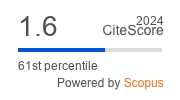Malaysian Journal of Mathematical Sciences, March 2024, Vol. 18, No. 1
On Soft Bitopological Ordered Spaces
Shalil, S. H., El-Sheikh, S. A., and Kandil, S. A.
Corresponding Email: slamma_elarabi@yahoo.com
Received date: 8 July 2023
Accepted date: 14 November 2023
Abstract:
This paper introduces soft bitopological ordered spaces, combining soft topological spaces with partial order relations. The authors extensively investigate increasing, decreasing, and balancing pairwise open and closed soft sets, analyzing their properties. They prove that the collection of increasing (decreasing) open soft sets forms an increasing (decreasing) soft topology. The paper thoroughly examines increasing and decreasing pairwise soft closure and interior operators. Notably, it introduces $bi-$ordered soft separation axioms, denoted as $PST_{i}\;(PST_{i}^{\bullet}, PST_{i}^{*},
PST_{i}^{**})-$ordered spaces, $i = 0, 1, 2$, showcasing their interrelationships through examples. It explores separation axiom distinctions in bitopological ordered spaces, referencing relevant literature such as the work of El-Shafei et al. [5]. The paper investigates new types of regularity and normality in soft bitopological ordered spaces and their connections to other properties. Importantly, it establishes the equivalence of three properties for a soft bitopological ordered space satisfying the conditions of being $TP^{*}$-soft regularly ordered: $PST_{2}-$ordered, $PST_{1}$-ordered, and $PST_{0}$-ordered. It introduces the concept of a $bi-$ordered subspace and explores its hereditary property. The authors define soft bitopological ordered properties using ordered embedding soft homeomorphism maps and verify their applicability for different types of $PST_{i}-$ordered spaces, $i = 0, 1, 2$. Finally, the paper identifies the properties of being a $TP^{*};(PP^{*})-$soft $T_{3}-$ordered space and a $TP$-soft $T_{4}$-ordered space as a soft bitopological ordered property.
Keywords: soft bitopological ordered space; increasing (decreasing) pairwise soft closure operator; $PST_{i}\;($ resp. $PST_{i}^{\bullet}, PST_{i}^{*}, PST_{i}^{**})-$ordered spaces; $(i = 0, 1, 2), \; TP\;(PP, TP^{*}, PP^{*})-$soft $T_{3}-$ordered spaces; $TP-$soft $T_{4}-$ordered space









